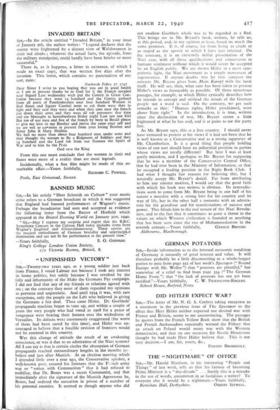UNFINISHED VICTORY "
Slu,—Twenty-two years ago, as a young soldier just back from France, I voted Labour not because I took any interest in home politics, but solely because I was revolted by the folly and inhumanity of the Make the Germans Pay campaign. I did not find that any of my friends or relations agreed with me ; on the contrary they most of them regarded my opinions as perverse and unpatriotic. And until 1934 it was, with rare exceptions, only the people on the Left who believed in giving the Germans a fair deal. Then came Hitler. Dr. Goebbels' propaganda machine began to tune up, and within a couple of years the very people who had voted in 1918 for a peace of vengeance were beating their breasts over the wickedness of Versailles. Its defects were enormously exaggerated (the worst of them had been cured by this time), and Hitler was en- couraged to believe that a forcible revision of frontiers would not be resented in this country.
Was this change of attitude the result of an awakening conscience, or was it due to an admiration of the Nazi system? All I can say is that is certain circles the absorption of German propaganda reached extraordinary lengths in the months jus. before and just after Munich. At an election meeting which I attended little over a year ago, the Conservative speaker, a well-known peer, assured his listeners that the French army wad so " rotten with Communism " that it had refused to mobilise, that Dr. Benes was a secret Communist, and that immediately after the signature of the Munich Agreement he, Benes, had ordered the execution in prison of a number of his personal enemies. It seemed as though anyone who did
not swallow Goebbels whole was to be regarded as a Red. This brings me to Mr. Bryant's book, written, he tells us, at this period, and, in my opinion at least, based on much the same premises. It is, of course, tar from being as crude or as stupid as the speech to which I have just referred. On the contrary, it is an extremely skilful presentation of the Nazi case, with all those qualifications and concessions to humane sentiment without which it would never be accepted by an English public. We are shown Hitler in a most sym- pathetic light, the Nazi movement as a simple movement of regeneration. If anyone doubts this let him compare the extracts Mr. Bryant gives from Mein Kampf with the book itself. He will see, then, what care has been taken to present Hitler's views as favourably as possible. Of those monstrous passages, for example, in which Hitler cynically describes how he intends to corrupt and mislead the minds of the German people not a word is said. On the contrary, we get such remarks as this: "Human rights, Hitler proclaimed, were above State right." In the introduction, it is true, written since the declaration of war, Mr. Bryant seems a little frightened at what he has said, and is at pains to toe the party line.
As Mr. Bryant says, this is a free country. I should never have ventured to protest at his views if it had not been that he is well known as a Conservative and as a strong supporter of Mr. Chamberlain. Is it a good thing that people holding views of one sort should have an influential position in parties whose views are totally different? But here I was at least partly mistaken, and I apologise to Mr Bryant for supposing that he was a member of the Conservative Central Office, that he had ever been in the Ministry of Information, or that he occupied a leading position in the Right Book Club. I had what I thought fair reasons for believing this, but I naturally accept Mr. Bryant's denial. Far from attributing to him any sinister motives, I would say that the good faith with which his book was written is obvious. Its contradic- tions seem to come from Mr. Bryant being in one half of his nature a moralist with a strong love for his country and its way of life, but in the other half a romantic with an admira- tion for the grandiose and for manifestations of success and power. This blinds him to the real nature of the Nazi Revolu- tion, and to the fact that it constitutes as great a threat to the values on which Western civilisation is founded as anything that has been seen since the rise of Mohammedanism in the






































 Previous page
Previous page